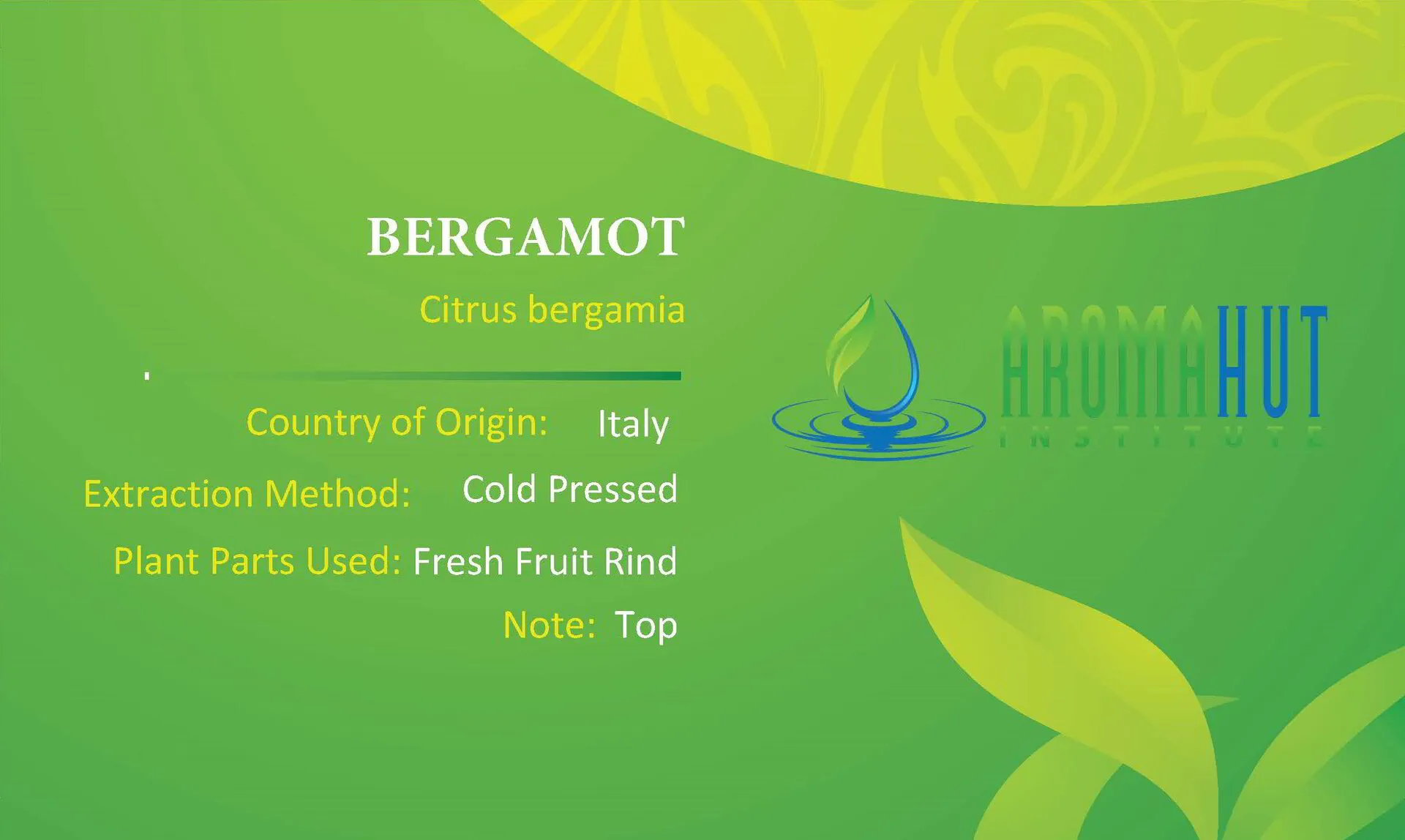PLANT PART
Fresh Fruit Rinds
AROMA
Balsamic, Sweet, Woody
NOTE
Top
Essential Oil Datasheets
Essential Oil Datasheet | Bergamot
Bergamot – Citrus bergamia
Bergamot essential oil is used in many skin care creams and lotions because of its refreshing and citrus nature. Its’ chemical makeup has antiseptic properties, which help ward off infection and aid recovery. It is a favorite oil of aromatherapists in treating depression, coughs, and is effective as an antispasmodic, reduces leg cramps, and is used for restless leg syndrome. Bergamot gives Earl Grey tea its vibrant citrus aroma.
Country of Origin:
Africa, Brazil, S. Italy
Extraction Method:
Cold Pressed
Botanical Family:
Rutaceae
Chemical Families:
Monoterpenes, Monoterpenols, Esters
Precautions
- Phototoxic – Avoid direct sunlight or sunbeds for 12-24 hours after topical application. It may be used safely (no phototoxic response) on the skin in a blend at no more than 0.4% (approx.1-2 drops per ounce of carrier). Or, if you are using the oil on an area of your skin that has no exposure to the sun or UV light, there is no safety concern.
- Possible skin irritant.
- Do not use on skin undiluted.
Therapeutic Properties
Bergamot essential oil is renowned for its delightful citrusy fragrance and a wide array of therapeutic properties. This fragrant oil is derived from the rind of the Bergamot orange, a fruit primarily grown in the Mediterranean region. However, the captivating aroma and numerous health benefits of Bergamot essential oil are not solely attributed to its natural source, but also to its complex chemical composition. This section will delve into the fascinating world of Bergamot essential oil's chemical components, shedding light on the compounds responsible for its distinctive scent and the potential health and wellness advantages they offer. From uplifting and calming properties to its diverse applications in aromatherapy, cosmetics, and more, understanding the chemistry behind Bergamot essential oil is key to appreciating its multifaceted nature. Chemically, it is a complex mixture of many classes of organic substances, particularly in the volatile fraction, including terpenes, esters, alcohols, and aldehydes, and for the non-volatile fraction, oxygenated heterocyclic compounds as coumarins and furanocoumarins. The main compounds in this oil are limonene, linalyl acetate, linalool, γ-terpinene, and β-pinene, and in smaller quantities geranial and β-bisabolene.
| Analgesic | Anti-inflammatory | Antibacterial |
| Antifungal | Antidepressant | Antiseptic |
| Antispasmodic | Antiviral | Carminative |
| Cooling | CNS Sedative | Neurotonic |
| Digestive | Hyoptensive | Immunostimulant |
Body Systems Applications
Circulatory System
Circulatory System
Digestive System
Digestive System
Abdominal Cramps
Apply topically over the abdomen to reduce and eliminate abdominal cramps.
Loss of Appetite
Diffuse or take internally in a capsule to stimulate appetite. It is also an effective aid for digestion.
Endocrine System
Endocrine System
Insomnia
Apply topically or diffuse aromatically before bed.
Stress
Apply topically to the back of the neck or bottoms of the feet. Diffuse aromatically as needed.
Immune System
Immune System
Integumentary System
Integumentary System
Fungal Issues
Apply topically to affected areas.
Acne and Oily Skin
Apply topically to the affected area as needed. May also be beneficial for eczema and psoriasis.
Limbic System
Limbic System
Emotional Balance
Diffuse aromatically to support emotional health and well-being; it is relaxing, restorative, calming, emotionally uplifting, supports the release of repressed emotion and feelings of worthlessness.
Insomnia
Diffuse aromatically to help reduce anxiety and encourage sleep.
Lymphatic System
Lymphatic System
Muscular System
Muscular System
Muscle Aches and Cramps
Apply topically to reduce tension and soothe tight muscles. Can be taken internally in a capsule as well.
Nervous System
Nervous System
Restless Leg Syndrome
Apply topically before bed to help minimize the urge to move legs around.
Reproductive System
Reproductive System
Respiratory System
Respiratory System
Coughs, Infections, and Bronchitis
Apply topically to the chest to treat spasmodic coughs, colds, and respiratory complaints.
Skeletal System
Skeletal System
Joint Issues
Apply topically to the affected area or take internally in a capsule.
Urinary System
Urinary System
Safety
Phototoxic - Avoid direct sunlight or sunbeds for 12-24 hours after applying Bergamot to the skin. Bergamot must not be applied to the skin undiluted. Serious skin burning or damage can occur if Bergamot is applied and the skin is exposed to the sun or a tanning booth. The International Fragrance Association (IFRA) restricts the use of bergamot essential oil due to its phototoxic effects. Specifically, IFRA recommends that leave-on skin products be limited to 0.4% bergamot oil,[4] which is more restrictive than any other Citrus-based essential oil.[5]






